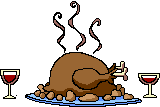So you're invited to a huge feast, and you've got diabetes. Or you're cooking for a big crowd, and you've got diabetes. The social pressure is on to stuff your face, and every cell in your body strains for the magical sensation of sweet and savory, tart and salty, the nostalgic flavors and aromas and all the good cheer that food can bring, because, let's face it, sometimes that's the best part of getting a lot of people together. Some of you will argue that the booze is the best part at this point, to which I give a polite nod.
At every feast, it's cool for people to say they ate themselves into a coma. Have you ever wondered why you get so sleepy after lots of food? It's not the turkey! Ever since I got a glucose monitor and became a little scientist, I have been mapping the feel goodity of food. And I discovered something just a little scary- the sleepy 'coma' feeling usually comes after a big BIG carb load, and that's when your blood sugar goes way WAY high, despite any medications you might be taking to keep it down. Normal people think they can get away with this, but they get sleepy, too. What gives?
I think that sleepy coma thing is the same reaction as people have to drinking alcohol, namely, the body shuts you down before you can send yourself over a toxic cliff. You fall asleep! Carb processing takes a little time. A carb overload, as everyone knows, results in FAT when you don't use it up. So what's a little fat, it's just one meal, right? That isn't the problem. The problems is in between the eating and the fat. For about two hours after you eat, your body does a complete inventory of incoming proteins, fats, and carbs. Nothing sits around too long or it makes you sick, so the body is constantly processing. Sometimes you get a bigger than normal shipment in, it takes a little longer to unload the truck and unpack all the boxes, and during all this, your pancreas and liver are working overtime to make sure YOU don't get a toxic buildup of raw materials dumping into your bloodstream. Like carbs.
Carbs are necessary for energy, although your body can switch to burning fat and even protein when it has to. Any carbs not being used right now or in the immediate future have to be stored as quickly as possible, and since the pancreas and liver help with this filtering process, they overwork and get backlogged. If you've heard of 'fatty liver', this is one way people get it, and it's actually very common. Thanx to years of meds and diabetes, I have a liver condition called NASH. Many people have no clue they have a liver condition until their livers are very sick. I'm not paid to link this next site, but for the morbidly curious, it's pretty good info. Signs and Symptoms of Ten Common Liver Diseases
In the last two years, I have turned myself completely around, lost 50 pounds, and have the best blood work in years, plus I made it through holidays last year without gaining a single pound. I didn't exercise much last winter, either, although I'm not advising you to *not* exercise. I'm currently in a program at the fitness center and feel so much better. But what I'm saying is, even with diabetes, I flew through holidays last year without any blood sugar problems. HOW????
I think a lot of diabetics aren't aware that proteins and fats don't spike your blood sugar. They're also not aware that there is a big difference between fast carbs and slow carbs. It's really weird, but 'healthy' carbs that take longer to digest can actually keep your blood sugar higher for a longer time than fast carbs. Maybe you've heard of 'high glycemic' carbs. Those are legumes (beans), all grains, most fruits (berries are generally ok to eat), and the kinds of veggies that fall into roots (potatoes and carrots) and gourds (pumpkin and squash). On the other hand, leafy greens (letttuces and spinach), brassica (includes cabbage, cauliflower, broccoli) and a few other kinds of things that you might like in salads, like radishes and olives, barely bother your blood sugar at all. If you like charts, you can find a glycemic index of some kind all over the internet.

Here comes the easy part.
The real scientists who came before me have figured out you can get away with about 10 grams of carbs per meal or snack roughly about every two hours without noticeably spiking your blood sugar, unless you're completely insulin dependent because your pancreatic beta cells literally can't produce your own insulin. Basically, you can have a cup of milk, as long as you skip all the bread, potatoes, corn, gravy, stuffing, and dessert. THAT SUCKS, you say. Ok, ok, you're right, that sucks. But I still really figured it out. I am a cookie addict. For many years, I haven't made it through a whole day without a cookie. Or two... J'adore cookies! When I found out about the glycemic thing and the 10 grams of carbs guideline, I thought ah-HA, but they can't make me stop eating cookies! I would break a cookie in half and wait a couple hours and eat the other half. I wound up eating cookies all day long that way.
And that's the secret.
First of all, it was thrilling to see my random and then my fasting glucose drop down all by itself without medication or exercise. I tried meds for 11 days and the doctor pulled me off, turns out I am excruciatingly med intolerant. And at the time, I was also too exercise intolerant to move around a whole lot. I wasn't that overweight, only 236 pounds (mostly from steroid meds), but coming from several generations of diabetics full of all kinds of complications, I know you don't necessarily lose a leg or your vision before you lose your life. Or worse, have multiple strokes and lose your ability to function and wind up in a nursing home for years. Because that happened to my mom. She was on the sorta skinny side when the strokes hit, but her glucose easily hit the 300-400's all the time. Her blood stayed 'sticky' all the time from her inability to process carbs properly, and that caused complications galore. She loved her pop and her flavored coffee and breakfast sweets and holiday goodies and mashed potatoes and bread...
Remember, diabetes doesn't always make you fat, and plenty of bigger people don't even have diabetes. And remember, if you HAVE diabetes, YOU have problems processing carbs. Your poor body is trying to keep up.
When I got into the habit of breaking my carb loads down into much more manageable chunks, I discovered it was getting easier and easier to do it all the time, even during holidays. Once you get used to actually feeling better (seriously, lost 50 pounds in 4 months ~doing that~), you suddenly notice how gross you feel when you 'carb out'. Like headaches. Wow, I couldn't believe how that cut down my headaches. And heartburn. I spent years treating heartburn, and while everyone thinks it's from fatty rich foods, I have proof that a goodly carb load is miserating for heartburn spiking back alive after you haven't experienced it in awhile. Also, my skin problems went away all by themselves, my liver enzymes went back to normal, my hair started growing in better, and I started feeling so much better that I was able to get out of the house and go shopping again. I went from driving a mobile cart around the store to walking around, and now I can walk all over a store before I get tired.
See, when you constantly carb load with diabetes, you are diverting your body's priorities away from other things, because your body is constantly working on *saving your life* (and ultimately failing). That sleepy 'coma'? That is a desperate scream from your body to STOP, yes, even for normal people. I never used to know what it was like to have energy after I ate a meal. I have energy *all* *the* *time* now because my body no longer has to divert all its resources to frantically scrubbing my blood while everything else goes to pot. I know this sounds ridiculous to some of you, but can you think of a better way to describe what is actually happening after a person with diabetes eats a big meal?
You can still eat pie and cake and gravy and creamed corn and all that stuff if you are diabetic, no one can stop you. But I'll tell you a secret. It's healthier if you simply just eat all the bacon you want ~instead~. Because that's what I did. I lost 50 pounds eating butter and bacon. I know that's *bad*, and I'm terrible for saying it. But I have the bloodwork to prove it worked for me. Triglycerides are fats made from carbs. You can lower triglycerides by cutting carbs. In the meantime, there are other ways to eat that are still very satisfying, like the Rosedale diet and the'caveman diet', also called the paleo diet.

A couple of myths about diabetes that annoy me to no end, because I've played the little scientist with my glucose monitor, is that eating protein with carbs slows down digestion so your glucose won't spike so badly, and eating cinnamon holds down blood glucose. There are more myths out there, but your body is no fool! There is no 'trick' that allows you to carb load without consequences when you are diabetic. Even normal people will get fatter when they carb load if they don't work it off right away like athletes, so no, there's no magic trick. Adding protein is good, yes, because people who carb load probably don't get enough protein anyway, but simply just eating protein doesn't give you free meter space for pie. Everything you eat with carbs impacts your entire body when you are diabetic.
The best way into this is small steps. I gradually cut down my carbs and kept spreading them out through the day so I wouldn't feel like I was torturing myself. One good way to feel satisfied about holiday food is go ahead and cook it, but not all on the same day. Spread it out through the week, make the whole week a holiday, spread the wonderful taste through your life. And why not? Why not have pumpkin pie in the summer? Why not have eggnog in the spring? Maybe the reason we gorge is because we never get it otherwise, and it's ~so good~. But that makes it not as special on the holiday, you say. And I say, Ah, but it makes the rest of the year *more* special. Get used to parceling out the wonderful food through your whole life, get used to smaller rewards and feeling better, and holidays become a breeze. You don't have to torture yourself with celery and grapefruit, all you have to do is count your carbs. Two or three bites of pie every couple of hours as long as you keep the rest as proteins, healthy fats, and low glycemic veggies and berries, and you can eat all the pie you want, around the clock, for days and days and days, as long as you only eat two or three bites every two hours.
One site that really helped me at the beginning was Blood Sugar 101. I was drowning in too much information until I found that site. Good luck with your stuff. I'm almost up to three years since I was diagnosed, and my doctor can't even tell on paper any more. My first year was full of huge changes and surprises, second year has been pretty sweet. Hugs to all of you still struggling with how to manage your diabetes. This works. Please try it.







 Lexxperience.com supports mobile viewing until Xanga gets that going again. (It's back on my Android now when I turn it sideways.)
Lexxperience.com supports mobile viewing until Xanga gets that going again. (It's back on my Android now when I turn it sideways.)
![]() Public sharing page for Lexx fans.
Public sharing page for Lexx fans.